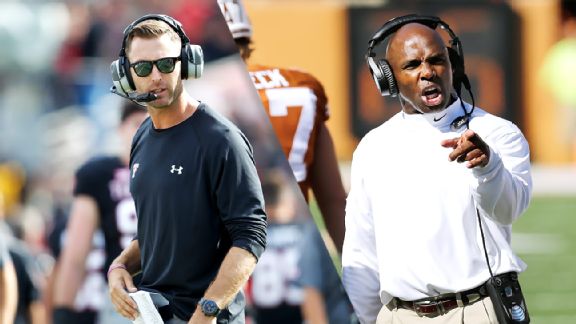In the state of Texas, the coaching dramas surrounding Charlie Strong of Texas and Kliff Kingsbury of Texas Tech are simultaneously very similar and very different.
These two stories, in the cities of Austin and Lubbock, affect a pair of schools with noticeably different national profiles and levels of resources. Yet, they boil down to the same basic problem:
Texas and Texas Tech are two classic embodiments of the creature known as the “half-a-loaf” football team.
They have one side of the ball figured out. One side of the ball is in very good hands. One side of the ball looks good now and will continue to thrive in the future.
The other side of the ball? Dumpster fire doesn’t even begin to seem like an adequate descriptor.
This brings up the part of coaching hires which is generally under-discussed by both fans and pundits (yes, we in the pundit class are guilty of it on a regular basis). What’s alarming is that it’s the part of coaching hires which also seems to be neglected by athletic directors when they vet the head coaching candidates they bring in.
Though Texas and Texas Tech are very different programs on many obvious levels, the Longhorns and the Red Raiders do share one fundamental trait: Inattentiveness to the coordinator position on the head coach’s “unfamiliar” side of the ball (aka, the side of the ball in which the head coach doesn’t specialize or invest most of his time) has proved to be disastrous.
The lesson should not be lost on any athletic director or search committee who pursues a coach at a Power 5 program in modern college football.
*
Let’s start with Texas and Charlie Strong in this examination of two “half-a-loaf” programs.
While Strong inherited a huge mess — one in which a central deficiency was a lack of skilled offensive players (which he must recruit in the next cycle) — the one thing coaches are expected to do in rebuilding situations is to create improvement as they go along. The fit between scheme and personnel will never be an easy one if the personnel side of the equation is lacking, but a coaching staff on one side of the ball should begin to make advancements in terms of the end result — not to the point of being spectacular, but in terms of demonstrating a basic level of competence.
Can we reasonably submit that Texas — against an injured TCU defense or Iowa State’s regular defense — should be able to score at least 14 to 17 points even when things aren’t going right? The continued propensity of this offense to completely cease to function, late into year two, shines a spotlight on the lack of talent in Austin. However, this no-show at Iowa State on Saturday is helpful in that it serves to underscore one important notion: Jay Norvell is not the answer at offensive coordinator. Not even close.
It makes you stop and wonder: How could Texas — TEXAS, in capital letters — not insist on a high-end offensive coordinator? Anyone who has a moderate degree of familiarity with the college football play-calling landscape can identify the better play callers in the business. For the Longhorns to not ensure that Strong — a defense-first coach — had the right staff on his “unfamiliar” side of the ball is, in a word, shocking.
Texas is a program which can write a blank-check amount for its coordinators. Vance Bedford is clearly a top-tier coordinator, but that’s the side of the ball Charlie Strong knows inside and out. His weaker side was simply not vetted enough, and now Texas is paying the price with continued drift and aimlessness. A staff overhaul is surely coming, but this could have — and should have — been done when Strong was first hired. That Texas has all the money in the world puts this reality more at the feet of Steve Patterson than Strong or anyone else. Patterson’s gone, though, so it’s not as though he can apply this lesson and resolve the problem in Austin. Interim AD Mike Perrin and the people surrounding him have to conduct a sit-down with Strong and go big with an offensive coordinator in December.
*
Keep this in mind about the Texas offensive coordinator situation, and about “half-a-loaf” programs led by coaches who specialize in one part of football and aren’t Dabo Swinney CEO types: Gary Patterson, a defensive whiz at TCU, realized he needed a prime offensive coordinator. The past two years (including this one), his program has not only taken off; it has largely been carried not by his defense, but by his offense. Patterson’s own internal evaluations led him to make the coordintor change which, in a post-Justin Fuente world, enabled his program to continue to move forward.
Credit to Patterson for devoting careful thought and energy to the side of the ball he knew less about. He brought in the coordinator who mattered — that’s why he’s such a successful head coach.
However, this is work an athletic director should do when he hires a coach. More specifically, when that head coach is so young and unproven, even more needs to be done to ensure he has the right people on his staff.
Yes, we’re now ready to talk about Kliff Kingsbury and another half-a-loaf situation at Texas Tech… only on defense, not offense.
*
The story of Kliff Kingsbury — viewed through the prism of how athletic directors and athletic departments must conduct their business — begins with a fundamental point not shared by a lot of other coaches (though Lane Kiffin is one): If you’re a Power 5 program with a considerable (enough) football reputation, hiring a really young coach — especially one who has not proven himself as a head coach — better be a slam-dunk.
Kingsbury — like Kiffin at both Tennessee and USC — was hired by Texas Tech before he turned 35. He was given the keys to a program which went 11-1 in the 2008 regular season under Mike Leach, a program located in a football-mad state which treats pigskin as a very big deal. If you’re going to hire a coach that young at a program with that kind of status (as opposed to a Group of Five program, especially one that’s very low on the FBS food chain), you are essentially saying that the present-day version of the coach is as good as any future version of the coach. You’re essentially saying, as an AD, that the coach you’re hiring doesn’t need any seasoning; he’s ready to win big now.
Just to show how much Texas Tech believes in the present-day incarnation of Kingsbury — not a wiser 43-year-old who has paid some dues in the business and understands more about cultivating a good defense — consider the fact that the Red Raiders gave him a lengthy contract extension. That alone is cause for concern, investing so much up-front money in a man who hasn’t yet shown that he can be a great head coach, something more than just a great offensive coordinator.
However, this larger analysis of Texas Tech’s dollar allocation — to its defensive coordinator and other parts of the football operation — is what really pounds home the notion that the Red Raiders have not used their resources well. The hire of Kingsbury actually could have been defensible if the school had handled the matter differently, but a lack of foresight — always a killer in coaching hires gone wrong — once again jumped to the forefront, much as it did in Austin with Texas’s offensive coordinators.
*
How could Texas Tech have hired Kingsbury in an acceptable manner? The school — in exchange for hiring Kingsbury at such a young age, giving him this incredible opportunity so early in his career — should have given him a lot less up-front money and used the savings (relative to the actual contract in place) to get a defensive coordinator and defensive staff which could make the program whole. Support staffing and other resources also could have benefited if Kingsbury had started out with a deal in the range of $1.5 million a year.
This is how Texas Tech should have played ball; had it done so, the Red Raiders would not be sitting here at the start of November, as the losers of TWO GAMES in 2015 in which they scored at least 52 POINTS! It’s hard enough to lose one game when you cross the half-a-hundred mark, but the Red Raiders have done it twice… and within the span of roughly one month!
Here is the achingly irritating reality for Texas Tech fans, framed by a tweet from a vigilant TSS reader:
When will we stop celebrating the coolness of Holgorsen & Kingsbury and simply realize they're not good head coaches? @SectionMZ
— OpinesJM (@OpinesJM) November 1, 2015
The reader is fundamentally correct. However, one distinction should be made between Holgo and Kliff:
In Kliff’s case, his side of the ball — his longtime field of expertise — is doing the job for his team.
Kingsbury came to Texas Tech as an offensive wizard, and he’s shown that by golly, he can coach the heck out of an offense. Kingsbury, if graded solely on the performance of his offense, gets an A, much as Charlie Strong gets an A for how he’s handled the Texas defense. (Maybe an A-minus in light of how California has since fallen off the grid, but no lower than an A-minus.)
Holgorsen, on the other hand, is a supposed offensive mastermind who can’t coach his offense right now. Holgo can’t cultivate a good quarterback, which is much more alarming. If your own natural field of expertise is the part (or half) of a team which suffers, your credibility is more at issue than it is for the “half-a-loaf” coaches who at least get it right in the part of football they know best.
Kingsbury and Strong have delivered their strengths. Their athletic directors simply did not address their weaknesses. It’s a specific and powerful way of showing that when you hire a head coach — either an established one such as Strong or a young pup such as Kingsbury — you have to account for the coordinator and other internal staff positions on the head coach’s weaker side.
In the state of Texas, this should be obvious. Moreover, the money and the football-centric culture in the state should also prevent this from happening:
@TheStudentSect it's a fascinating puzzle. Is he vastly overpaid? If not, TTU should pony up. If so, same answer with different implication.
— ProbableTimePOTY (@badnocall) October 31, 2015
Vet your head coaches when they clearly specialize in one side of the ball.
Pony up money for coordinators and staffing positions on the head coach’s weaker side.
Make young coaches — if you’re willing to entrust them with your program — earn big dollars in their first years, and pass the savings on to your “weaker side” coordinators and position coaches.
Are we done? Good. Let’s prevent future “Texas two-steps” and half-a-loaf situations from occurring.


